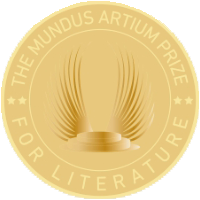The Mundus Artium Prize
Awarded by Mundus Artium: The Journal of International Letters and the Arts, the annual Mundus Artium Prize honors a lifetime of literary achievement in any language or genre.
The prize's philosophy reflects that of the Mundus Artium journal whose name, "World of Arts" in English, suggests a worldwide community of literary artistry and artful literacy.
The prize recognizes those authors who, in the judgement of the prize committee, present a magnanimous and prophetic vision of human civilization and celebrate its shared past and present evolution. The prize is intended as a ritual of belonging to an ancient and self-renewing citizenship of literary art that stands as an alternative to division and injustice.
Because that world arises as the sum of many constituencies, the Mundus Artium Prize highlights writing with origins in many languages. The prize recognizes that the lingua franca, English, must be renewed and made to serve as a means of accessing and sharing the distinctive experiences to be found across our planet.
The prize is administered and decided by the Mundus Artium Prize committee, a group that includes literary and academic figures.
Because we care about writers and writing, our prize organizers strive to make each year's award a special event for the recipient and the public, both internationally and indigenously for each honoree. In addition to an official announcement, the winning writer may opt to receive the prize's diploma, personalized medal and commemorative gift during an award ceremony in the recipient's own location.
This way of marking the occasion of awards can be particularly meaningful where the creative and cultural communities and observers generally best informed about the writers' work, as well as friends, family and other interested audiences, can most readily share in celebrations. Such gatherings can also add to how the awardees are understood elsewhere in the world.
The Mundus Artium Prize - Laureates
2025 - Khosiat Rustam (Uzbekistan)
2024 - Vlashi Fili (USA - Albania)
2023 - Alex Pausides (Cuba)
2022 - Liubita Raichici (Romania)
2024 - Vlashi Fili (USA - Albania)
2023 - Alex Pausides (Cuba)
2022 - Liubita Raichici (Romania)

